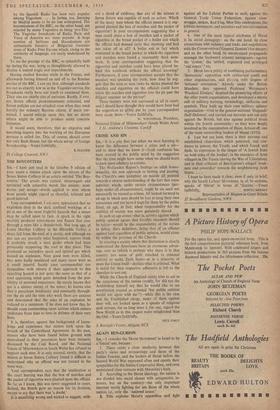THE BOYCOTTERS SIR,-1 have just read in the October 9
edition of your paper a vicious attack upon the miners of the Seven Sisters Colliery in an article entitled 'The Boy- cotters.' The article was cynical, extravagant and sprinkled with colourful words like sinister, mon- strous and savage—words applied to men whom most people might regard as cheerful, tolerant and good-natured.
Your correspondent, I am sure, appreciates that an explosion deep in the dark confined workings of a pit is one of the most frightful hazards that a miner may be called upon to face. A spark in the right mixture produces convulsions and flames that roar through a mine like a thunderbolt. Not long ago, at Lewis Merthyr Colliery in the Rhondda Valley, a stone fell from the roof of a cavity, and although no one can say precisely what happened, experts think it probably struck a steel girder which had been previously supporting the roof at that place. This produced an incendive spark and ignited gas which caused an explosion. Nine good men were killed, two were badly mutilated and many more were as a result injured. Surely your correspondent can sympathise with niiners if their approach to this appalling hazard is not quite the same as that of a cool appraising mind quite detached from the pos- sibility of personal experience. He surely knows that gas is a sinister enemy of the miner; he knows also that it percolates insidiously and constantly through- out the pit and the men who work there are anxious and determined that the risks of an explosion be reduced to a minimum. If he does not know this, he should cease commenting upon actions which miners undertake from time to time in defence of their very lives.
It is, therefore, against this background of know- ledge and experience that miners look upon the breach of the Contraband Agreement. In the past, miners who have been found below ground with contraband in their possession have been instantly dismissed by the Coal Board, and the National Union of Mineworkers in South Wales has refused to support such men. It is only natural, surely, that the miners at Seven Sisters Colliery found it difficult to understand why an official was not treated in the same way.
Your correspondent says that the implication at the court hearing was that the box of matches and the packet of cigarettes were planted upon the official. So far as I know, this was never suggested in court. Indeed, the Bench gave no reason for its decision, except to say that there was 'a doubt.'
It is manifestly wrong and wicked to suggest, with-
out a shred of evidence, that any of the miners at Seven Sisters was capable of such an action. Which of the many men whom the official passed is it sug- gested planted the box of matches and the packet of cigarettes? Is your correspondent suggesting that a man could place a box of matches and a packet of cigarettes in the breast pocket of a boiler suit which the official had donned early that morning and had not taken off at all? A boiler suit in fact which contained in the breast pocket in which the cigarettes and matches were found a reasonably thick note- book. is your correspondent suggesting that the cigarettes and matches could have been placed be- hind this notebook without the official knowing? Furthermore, if your correspondent accepts that the searcher was speaking the truth, how does he sug- gest that the man or men (who he thinks planted the matches and cigarettes on the official) could have taken the matches and cigarettes into the pit past the diligent searcher on the pit-top?
These matters were not canvassed at all in court, and I should have thought they would have been had the suggestion so glibly put by your correspondent been made there.—Yours faithfully, 2 St. Andrew's Crescent, Cardiff














































 Previous page
Previous page